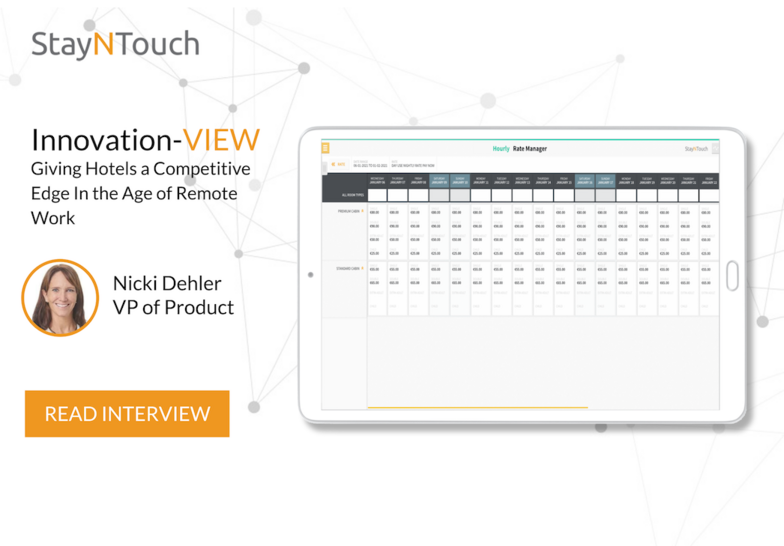
StayNTouch Innovation-VIEW: Giving Hotels a Competitive Edge in the Age of Remote Work
We sat down in a series of interviews with the product gurus and industry experts behind the innovation of StayNTouch Cloud PMS to discuss how
By Justin DeRise
The foundation of any hotel sales and revenue strategy lies in its distribution channels. A distribution channel is simply any forum or platform that a hotel uses to advertise and sell its rooms. This can include a hotel’s website, its social media platforms, phone or email reservations, metasearch engines, or OTAs. Although hotels can 一 and should 一 diversify their income streams and realize the potential of ancillary revenue, distribution remains the cornerstone of hotel profitability and success. This article will examine how hotels can leverage distribution technology and strategies to drive bookings, access new markets, and increase profitability.
While it may be tempting for hotels to focus heavily on a single distribution channel, or spread their energy over as many channels as possible, neither of these is likely to be a successful strategy. Focus too narrowly and you miss potential customers; focus too broadly and you risk wasting resources on unproductive channels. Each type of channel has its own advantages and disadvantages:
Developing a successful distribution strategy is about striking the right balance between a hotel’s various distribution channels. Of course, no single ideal channel mix will work for all hotels. A particular brand’s optimal distribution strategy will depend on its size, regional market, customer base, and various commission and acquisition costs.
Many hotels invest in a channel manager to optimize their booking strategy and manage distribution from multiple sources. The advantages of using a channel manager are numerous: Channel managers deliver access to OTAs and global markets, while directly synchronizing all bookings with the hotel’s PMS or central reservation system (CRS). Whenever someone books a room at your hotel through any distribution channel, the channel manager will automatically update both the PMS and all of the other channels in your distribution basket. Automating channel management can save enormous amounts of time and money, but it can also minimize instances of overbooking, which can strain operations and alienate guests.
A channel manager is also an important hub for customer data and business intelligence. Monitoring your distribution costs, and understanding which channels generate the most traffic and revenue can help you optimize rates and distribution, capitalize on upsell and add-on opportunities, and better understand where your competitors are earning revenue. And because a channel manager compiles channel mix data automatically, your staff can spend less time sourcing data, and more time developing more optimized distribution strategies, more engaging social media campaigns, and more relevant packages for your guests.
By integrating your channel manager with an Internet Booking Engine (IBE), you open the possibility of generating commission-free direct bookings. With a booking engine, flexibility and seamlessness are key: Most hotel booking sites suffer from an abysmal 2% (!!) conversion rate, meaning that for every 100 people who visit the site, fewer than 2 will actually book a room. The reasons for this are partially technological and partially market-oriented. Almost two-thirds of website traffic comes from mobile devices, and 53% of visitors will abandon a site if it takes longer than three seconds to load. Alternatively, over 69% of travelers worry about finding the best price, and in a digital version of “showrooming,” often visit a hotel’s website only to turn around and book through an OTA.
Consequently, it’s important to have a booking engine that has a fast and seamless integration with your channel manager and PMS. It should also be mobile-optimized, with a colorful interface that makes it as easy as possible to view availability and book a room. You should also have a channel manager that can easily establish rate parity between your hotel’s website and various OTA listings to limit the incentive to “showroom.” Conversely, leveraging a booking engine’s ability to create custom add-ons, package deals, and specialized rates gives customers a reason to book direct 一 and keep booking directly in the future. Finally, being able to incorporate a customizable booking widget into any webpage makes it easy to drive bookings from social media and outreach campaigns.
The one advantage that hotels have over OTAs is that they actually deliver the service that travelers are purchasing. Not to state the obvious, but bookings and customer loyalty are ultimately driven by exceptional service and an amazing guest experience.
Here, technology can also play an outsized role. Channel managers and booking engines allow your guests to choose how they book, but a PMS with flexible asset classes can give them a choice in what they book. Offering day-use or hourly rates allows your hotel to cater to busy remote workers or airport travelers, while extended-stay options can appeal to the short-term rental market.
Deliver a memorable first impression by creating a lobby that’s designed for socializing, dining, and co-working, and give your guests the option to check in however they want: through their smartphone, a guest-facing kiosk, or a friendly associate aided by a tablet. Allowing them to further personalize their stay through targeted mobile upgrade and amenity offers will also not go unnoticed.
It’s also critical to empower your staff to deliver the best service they can. Leveraging a mobile PMS that can run on a tablet frees your staff to meet guests wherever they are, while robust automation, mobile communication and an intuitive user interface ensure that their interactions with guests are focused and engaging. Instant mobile room updates can inform the front desk whenever new rooms are ready, and will help prevent your housekeeping teams from mistakenly disturbing an occupied room. Finally, leave your guests with a memorable last impression by offering monetized late-check out directly through their mobile devices.
It’s always easier to earn business from repeat customers. It’s critical for hotels to recognize their repeat customers and give them every incentive to book direct in the future. While loyalty programs do incentivize repeat stays, there’s more to recognizing long-term customers than marking milestone stays with upgrades or discounts. Your hotel should create a unified and increasingly personalized guest experience that grows and develops with time. A mobile PMS will automatically build an increasingly nuanced guest profile, complete with room and rate preferences, as well as customized notes and requests. This information can be available to every integrated platform in your tech stack and every staff member in your property or chain. So instead of trying to find a “deal” through an anonymous OTA, travelers can build a relationship with a hotel brand that feels less like a place to stay and more like a “home away from home” with each successive visit.

We sat down in a series of interviews with the product gurus and industry experts behind the innovation of StayNTouch Cloud PMS to discuss how

Luxury travel is booming: high-price trips are the strongest-growing market. An incredible 46 million international luxury trips were taken in 2014 (worth $148.62 billion); by

The key to finding opportunities to enhance the guest experience is to focus in on the things that guests secretly crave. —Justin DeRise Before we


See how StayNtouch’s Cloud PMS, Guest Mobility, and Guest Kiosk solutions deliver better results for hotels through better front & back of house communication, increased mobile touch-points, more revenue and operational efficiency, and unlimited interfaces.
Your demo will include how to:

Manage and Set Tasks Across Your Departments

Ensure Guest Satisfaction & Safety With Contactless Check-in Options

Automate Easy Upsells & Monetized Early/Late Checkouts

Set & Manage Rates/Availability

Integrate With Tools and Platforms Essential
to Your Hotel
And More!